A Comprehensive Corporate Governance Assessment of Tesco PLC
VerifiedAdded on 2023/06/15
|11
|3372
|216
Report
AI Summary
This report provides a comprehensive assessment of corporate governance at Tesco, examining key aspects such as the purpose of the corporation, the role of shareholders, the composition and responsibilities of the board of directors, executive remuneration, and the definition and disclosure of corporate performance. It also explores the roles of media, government, and civic society in influencing corporate governance. The analysis incorporates theoretical frameworks like Stakeholder Theory and Legitimacy Theory to understand the relationships between Tesco, its stakeholders, and broader societal expectations. Challenges in corporate governance are discussed, and the report concludes with an overview of Tesco's approach to maintaining a robust and ethical governance structure. Desklib provides students access to similar solved assignments.
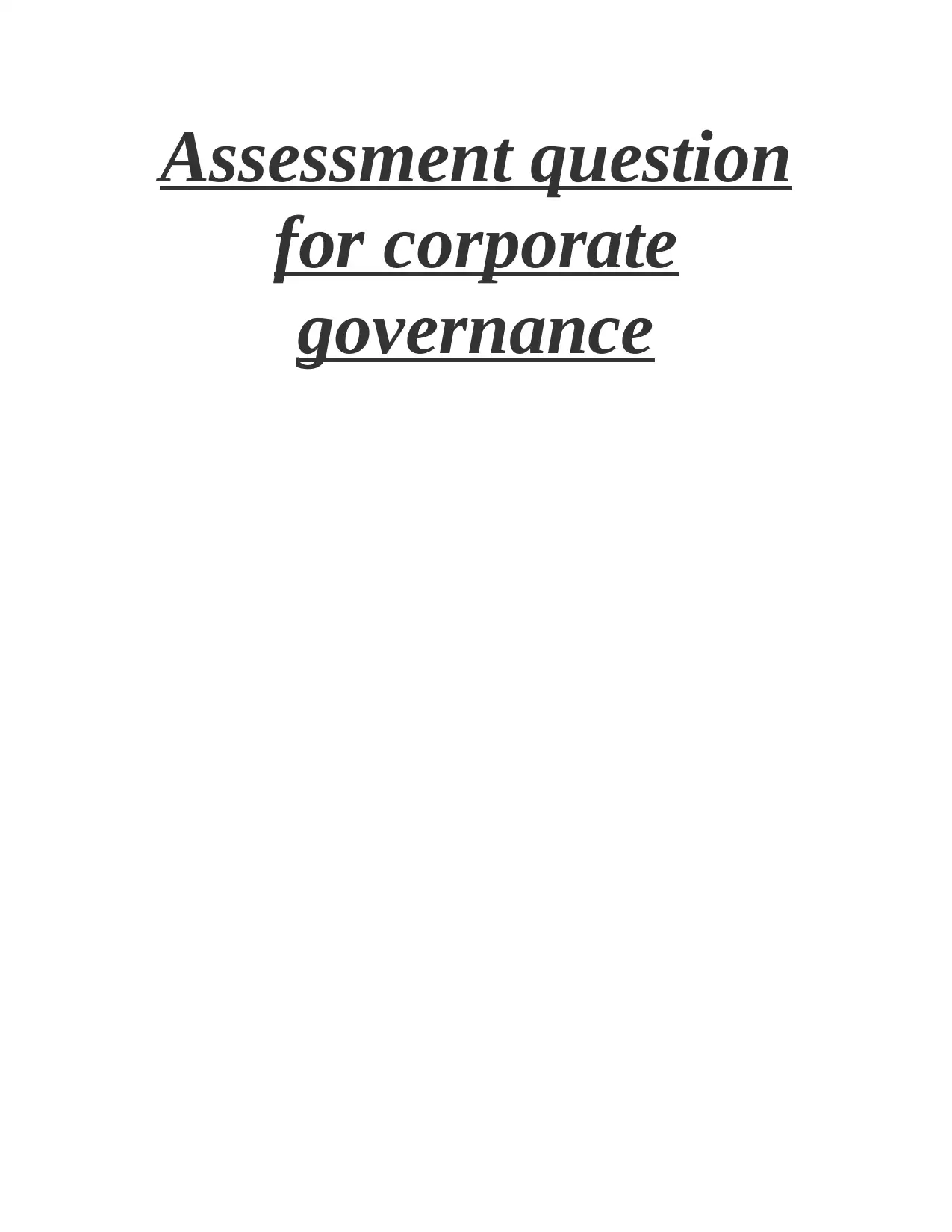
Assessment question
for corporate
governance
for corporate
governance
Paraphrase This Document
Need a fresh take? Get an instant paraphrase of this document with our AI Paraphraser
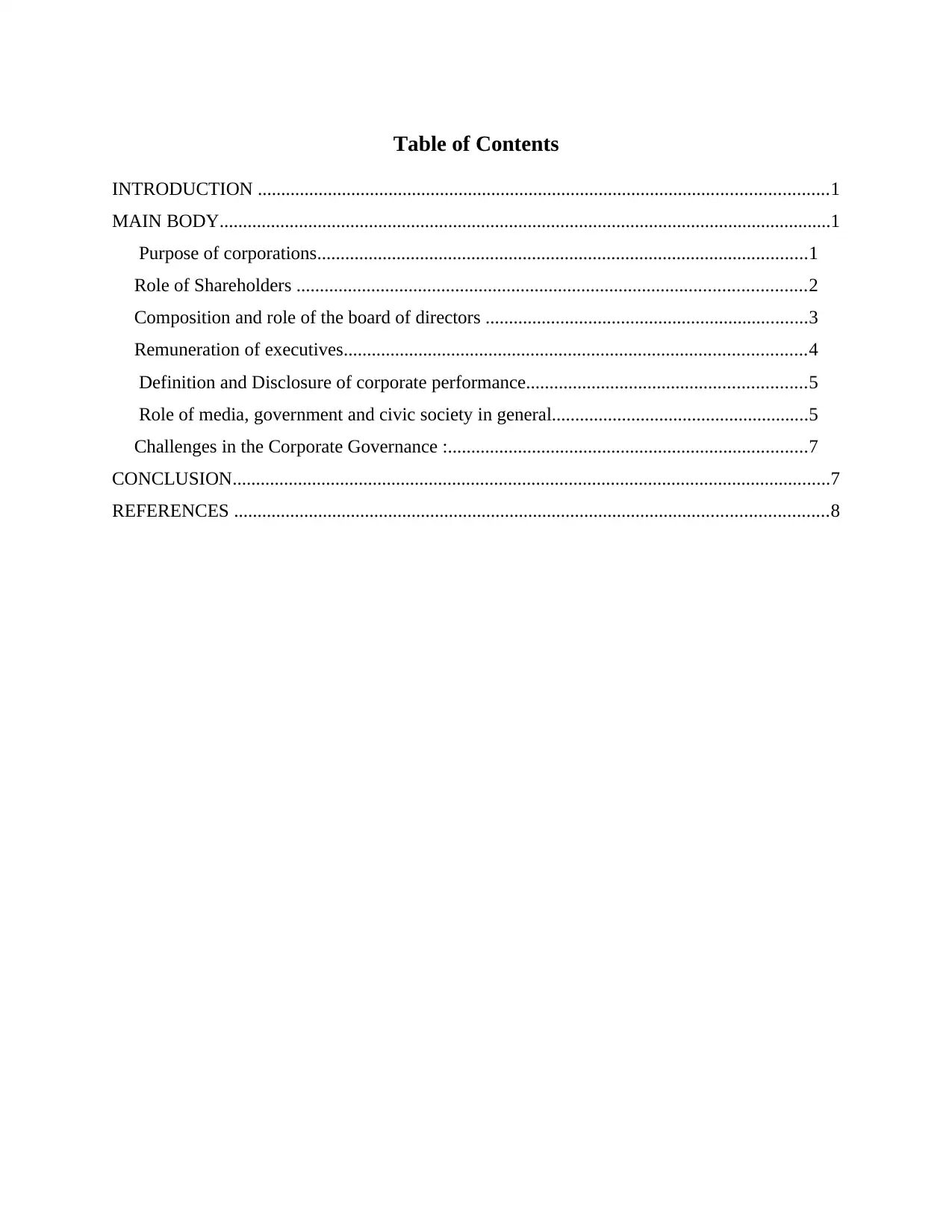
Table of Contents
INTRODUCTION ..........................................................................................................................1
MAIN BODY...................................................................................................................................1
Purpose of corporations.........................................................................................................1
Role of Shareholders .............................................................................................................2
Composition and role of the board of directors .....................................................................3
Remuneration of executives...................................................................................................4
Definition and Disclosure of corporate performance............................................................5
Role of media, government and civic society in general.......................................................5
Challenges in the Corporate Governance :.............................................................................7
CONCLUSION................................................................................................................................7
REFERENCES ...............................................................................................................................8
INTRODUCTION ..........................................................................................................................1
MAIN BODY...................................................................................................................................1
Purpose of corporations.........................................................................................................1
Role of Shareholders .............................................................................................................2
Composition and role of the board of directors .....................................................................3
Remuneration of executives...................................................................................................4
Definition and Disclosure of corporate performance............................................................5
Role of media, government and civic society in general.......................................................5
Challenges in the Corporate Governance :.............................................................................7
CONCLUSION................................................................................................................................7
REFERENCES ...............................................................................................................................8
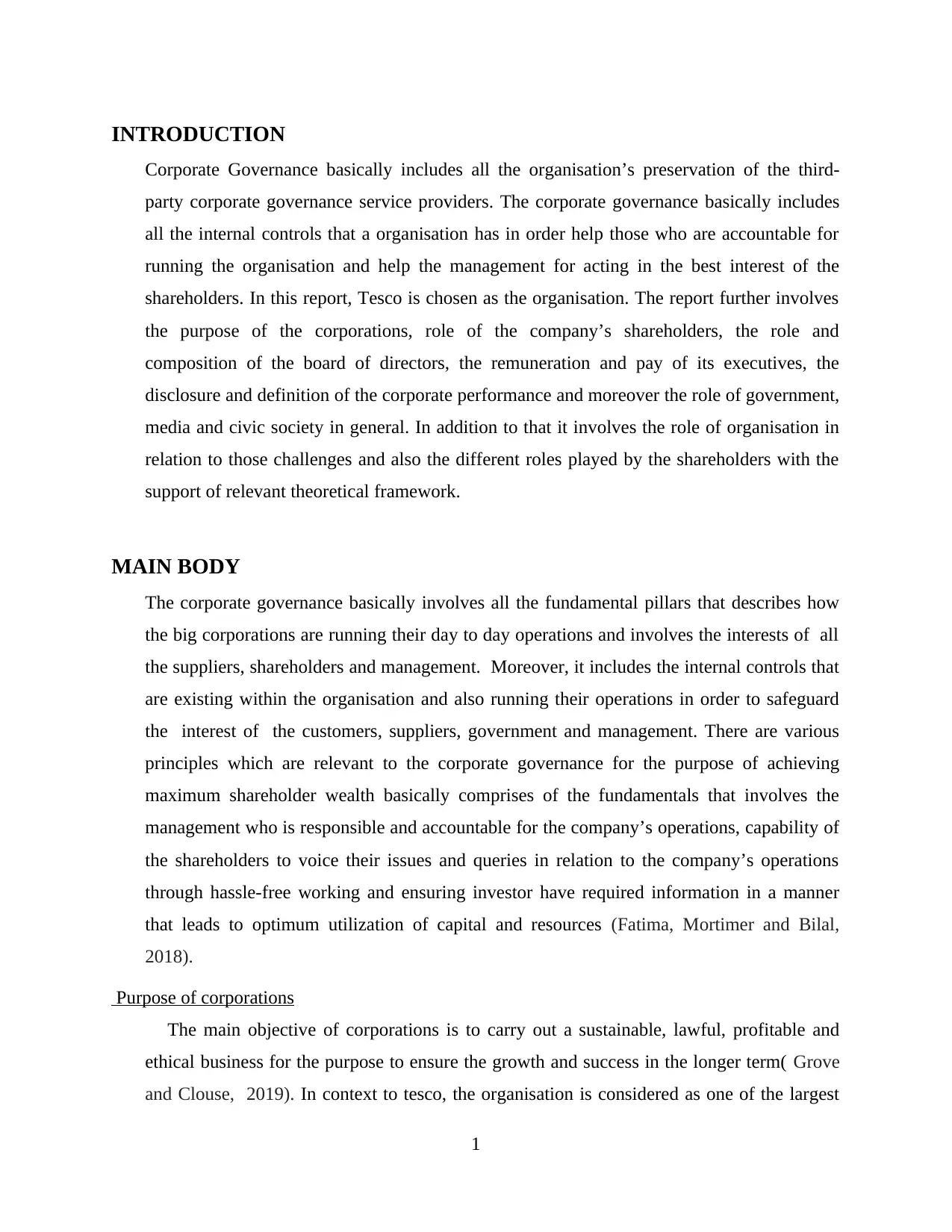
INTRODUCTION
Corporate Governance basically includes all the organisation’s preservation of the third-
party corporate governance service providers. The corporate governance basically includes
all the internal controls that a organisation has in order help those who are accountable for
running the organisation and help the management for acting in the best interest of the
shareholders. In this report, Tesco is chosen as the organisation. The report further involves
the purpose of the corporations, role of the company’s shareholders, the role and
composition of the board of directors, the remuneration and pay of its executives, the
disclosure and definition of the corporate performance and moreover the role of government,
media and civic society in general. In addition to that it involves the role of organisation in
relation to those challenges and also the different roles played by the shareholders with the
support of relevant theoretical framework.
MAIN BODY
The corporate governance basically involves all the fundamental pillars that describes how
the big corporations are running their day to day operations and involves the interests of all
the suppliers, shareholders and management. Moreover, it includes the internal controls that
are existing within the organisation and also running their operations in order to safeguard
the interest of the customers, suppliers, government and management. There are various
principles which are relevant to the corporate governance for the purpose of achieving
maximum shareholder wealth basically comprises of the fundamentals that involves the
management who is responsible and accountable for the company’s operations, capability of
the shareholders to voice their issues and queries in relation to the company’s operations
through hassle-free working and ensuring investor have required information in a manner
that leads to optimum utilization of capital and resources (Fatima, Mortimer and Bilal,
2018).
Purpose of corporations
The main objective of corporations is to carry out a sustainable, lawful, profitable and
ethical business for the purpose to ensure the growth and success in the longer term( Grove
and Clouse, 2019). In context to tesco, the organisation is considered as one of the largest
1
Corporate Governance basically includes all the organisation’s preservation of the third-
party corporate governance service providers. The corporate governance basically includes
all the internal controls that a organisation has in order help those who are accountable for
running the organisation and help the management for acting in the best interest of the
shareholders. In this report, Tesco is chosen as the organisation. The report further involves
the purpose of the corporations, role of the company’s shareholders, the role and
composition of the board of directors, the remuneration and pay of its executives, the
disclosure and definition of the corporate performance and moreover the role of government,
media and civic society in general. In addition to that it involves the role of organisation in
relation to those challenges and also the different roles played by the shareholders with the
support of relevant theoretical framework.
MAIN BODY
The corporate governance basically involves all the fundamental pillars that describes how
the big corporations are running their day to day operations and involves the interests of all
the suppliers, shareholders and management. Moreover, it includes the internal controls that
are existing within the organisation and also running their operations in order to safeguard
the interest of the customers, suppliers, government and management. There are various
principles which are relevant to the corporate governance for the purpose of achieving
maximum shareholder wealth basically comprises of the fundamentals that involves the
management who is responsible and accountable for the company’s operations, capability of
the shareholders to voice their issues and queries in relation to the company’s operations
through hassle-free working and ensuring investor have required information in a manner
that leads to optimum utilization of capital and resources (Fatima, Mortimer and Bilal,
2018).
Purpose of corporations
The main objective of corporations is to carry out a sustainable, lawful, profitable and
ethical business for the purpose to ensure the growth and success in the longer term( Grove
and Clouse, 2019). In context to tesco, the organisation is considered as one of the largest
1
⊘ This is a preview!⊘
Do you want full access?
Subscribe today to unlock all pages.

Trusted by 1+ million students worldwide
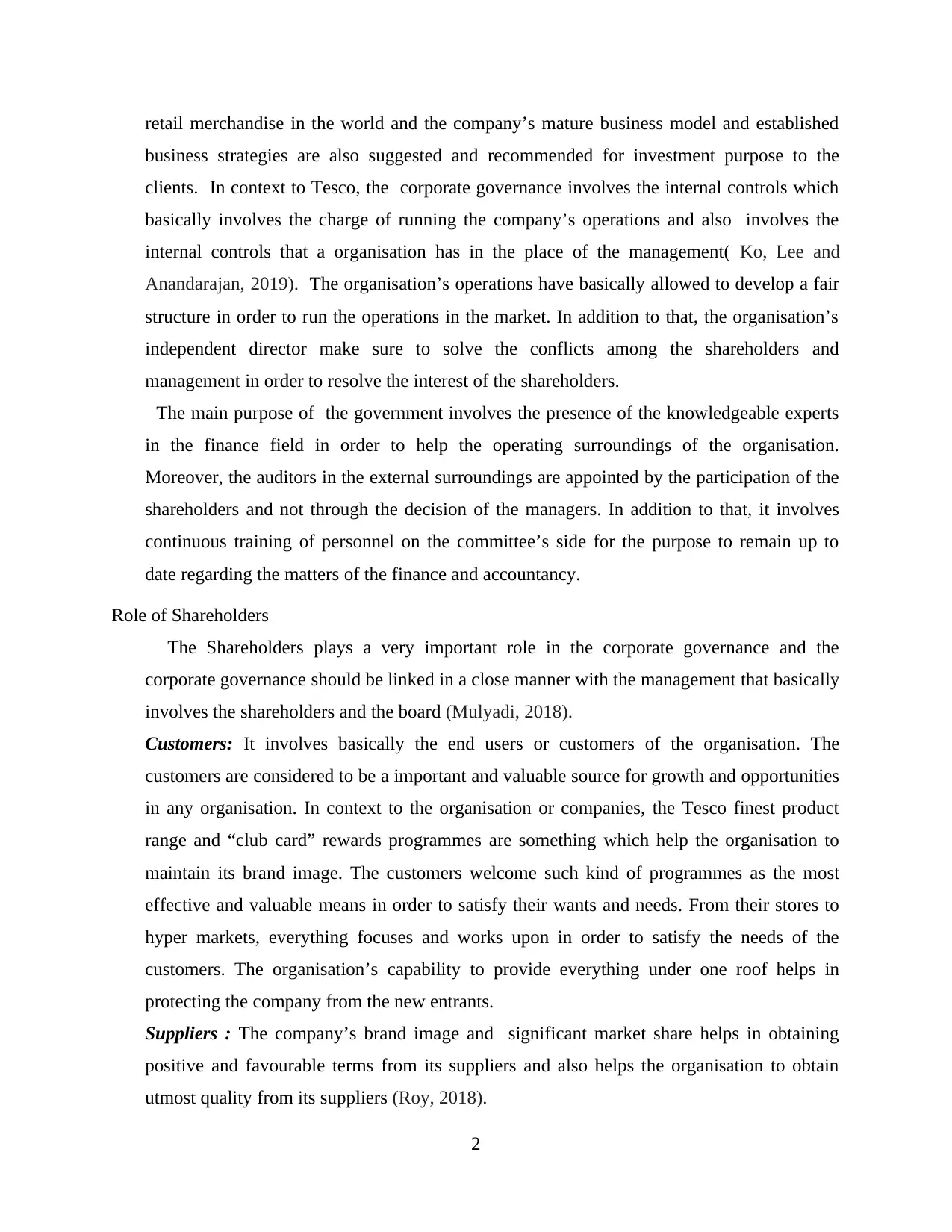
retail merchandise in the world and the company’s mature business model and established
business strategies are also suggested and recommended for investment purpose to the
clients. In context to Tesco, the corporate governance involves the internal controls which
basically involves the charge of running the company’s operations and also involves the
internal controls that a organisation has in the place of the management( Ko, Lee and
Anandarajan, 2019). The organisation’s operations have basically allowed to develop a fair
structure in order to run the operations in the market. In addition to that, the organisation’s
independent director make sure to solve the conflicts among the shareholders and
management in order to resolve the interest of the shareholders.
The main purpose of the government involves the presence of the knowledgeable experts
in the finance field in order to help the operating surroundings of the organisation.
Moreover, the auditors in the external surroundings are appointed by the participation of the
shareholders and not through the decision of the managers. In addition to that, it involves
continuous training of personnel on the committee’s side for the purpose to remain up to
date regarding the matters of the finance and accountancy.
Role of Shareholders
The Shareholders plays a very important role in the corporate governance and the
corporate governance should be linked in a close manner with the management that basically
involves the shareholders and the board (Mulyadi, 2018).
Customers: It involves basically the end users or customers of the organisation. The
customers are considered to be a important and valuable source for growth and opportunities
in any organisation. In context to the organisation or companies, the Tesco finest product
range and “club card” rewards programmes are something which help the organisation to
maintain its brand image. The customers welcome such kind of programmes as the most
effective and valuable means in order to satisfy their wants and needs. From their stores to
hyper markets, everything focuses and works upon in order to satisfy the needs of the
customers. The organisation’s capability to provide everything under one roof helps in
protecting the company from the new entrants.
Suppliers : The company’s brand image and significant market share helps in obtaining
positive and favourable terms from its suppliers and also helps the organisation to obtain
utmost quality from its suppliers (Roy, 2018).
2
business strategies are also suggested and recommended for investment purpose to the
clients. In context to Tesco, the corporate governance involves the internal controls which
basically involves the charge of running the company’s operations and also involves the
internal controls that a organisation has in the place of the management( Ko, Lee and
Anandarajan, 2019). The organisation’s operations have basically allowed to develop a fair
structure in order to run the operations in the market. In addition to that, the organisation’s
independent director make sure to solve the conflicts among the shareholders and
management in order to resolve the interest of the shareholders.
The main purpose of the government involves the presence of the knowledgeable experts
in the finance field in order to help the operating surroundings of the organisation.
Moreover, the auditors in the external surroundings are appointed by the participation of the
shareholders and not through the decision of the managers. In addition to that, it involves
continuous training of personnel on the committee’s side for the purpose to remain up to
date regarding the matters of the finance and accountancy.
Role of Shareholders
The Shareholders plays a very important role in the corporate governance and the
corporate governance should be linked in a close manner with the management that basically
involves the shareholders and the board (Mulyadi, 2018).
Customers: It involves basically the end users or customers of the organisation. The
customers are considered to be a important and valuable source for growth and opportunities
in any organisation. In context to the organisation or companies, the Tesco finest product
range and “club card” rewards programmes are something which help the organisation to
maintain its brand image. The customers welcome such kind of programmes as the most
effective and valuable means in order to satisfy their wants and needs. From their stores to
hyper markets, everything focuses and works upon in order to satisfy the needs of the
customers. The organisation’s capability to provide everything under one roof helps in
protecting the company from the new entrants.
Suppliers : The company’s brand image and significant market share helps in obtaining
positive and favourable terms from its suppliers and also helps the organisation to obtain
utmost quality from its suppliers (Roy, 2018).
2
Paraphrase This Document
Need a fresh take? Get an instant paraphrase of this document with our AI Paraphraser
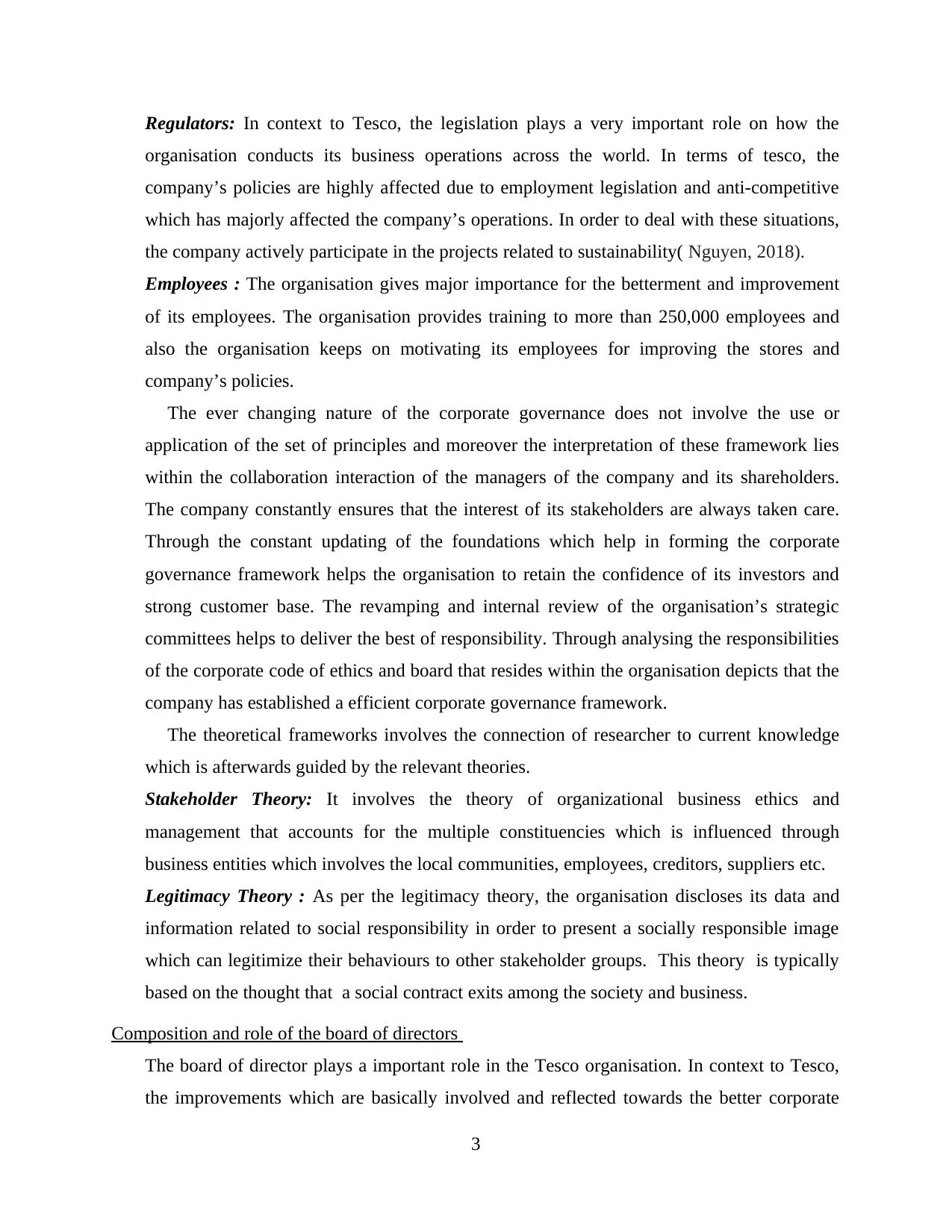
Regulators: In context to Tesco, the legislation plays a very important role on how the
organisation conducts its business operations across the world. In terms of tesco, the
company’s policies are highly affected due to employment legislation and anti-competitive
which has majorly affected the company’s operations. In order to deal with these situations,
the company actively participate in the projects related to sustainability( Nguyen, 2018).
Employees : The organisation gives major importance for the betterment and improvement
of its employees. The organisation provides training to more than 250,000 employees and
also the organisation keeps on motivating its employees for improving the stores and
company’s policies.
The ever changing nature of the corporate governance does not involve the use or
application of the set of principles and moreover the interpretation of these framework lies
within the collaboration interaction of the managers of the company and its shareholders.
The company constantly ensures that the interest of its stakeholders are always taken care.
Through the constant updating of the foundations which help in forming the corporate
governance framework helps the organisation to retain the confidence of its investors and
strong customer base. The revamping and internal review of the organisation’s strategic
committees helps to deliver the best of responsibility. Through analysing the responsibilities
of the corporate code of ethics and board that resides within the organisation depicts that the
company has established a efficient corporate governance framework.
The theoretical frameworks involves the connection of researcher to current knowledge
which is afterwards guided by the relevant theories.
Stakeholder Theory: It involves the theory of organizational business ethics and
management that accounts for the multiple constituencies which is influenced through
business entities which involves the local communities, employees, creditors, suppliers etc.
Legitimacy Theory : As per the legitimacy theory, the organisation discloses its data and
information related to social responsibility in order to present a socially responsible image
which can legitimize their behaviours to other stakeholder groups. This theory is typically
based on the thought that a social contract exits among the society and business.
Composition and role of the board of directors
The board of director plays a important role in the Tesco organisation. In context to Tesco,
the improvements which are basically involved and reflected towards the better corporate
3
organisation conducts its business operations across the world. In terms of tesco, the
company’s policies are highly affected due to employment legislation and anti-competitive
which has majorly affected the company’s operations. In order to deal with these situations,
the company actively participate in the projects related to sustainability( Nguyen, 2018).
Employees : The organisation gives major importance for the betterment and improvement
of its employees. The organisation provides training to more than 250,000 employees and
also the organisation keeps on motivating its employees for improving the stores and
company’s policies.
The ever changing nature of the corporate governance does not involve the use or
application of the set of principles and moreover the interpretation of these framework lies
within the collaboration interaction of the managers of the company and its shareholders.
The company constantly ensures that the interest of its stakeholders are always taken care.
Through the constant updating of the foundations which help in forming the corporate
governance framework helps the organisation to retain the confidence of its investors and
strong customer base. The revamping and internal review of the organisation’s strategic
committees helps to deliver the best of responsibility. Through analysing the responsibilities
of the corporate code of ethics and board that resides within the organisation depicts that the
company has established a efficient corporate governance framework.
The theoretical frameworks involves the connection of researcher to current knowledge
which is afterwards guided by the relevant theories.
Stakeholder Theory: It involves the theory of organizational business ethics and
management that accounts for the multiple constituencies which is influenced through
business entities which involves the local communities, employees, creditors, suppliers etc.
Legitimacy Theory : As per the legitimacy theory, the organisation discloses its data and
information related to social responsibility in order to present a socially responsible image
which can legitimize their behaviours to other stakeholder groups. This theory is typically
based on the thought that a social contract exits among the society and business.
Composition and role of the board of directors
The board of director plays a important role in the Tesco organisation. In context to Tesco,
the improvements which are basically involved and reflected towards the better corporate
3
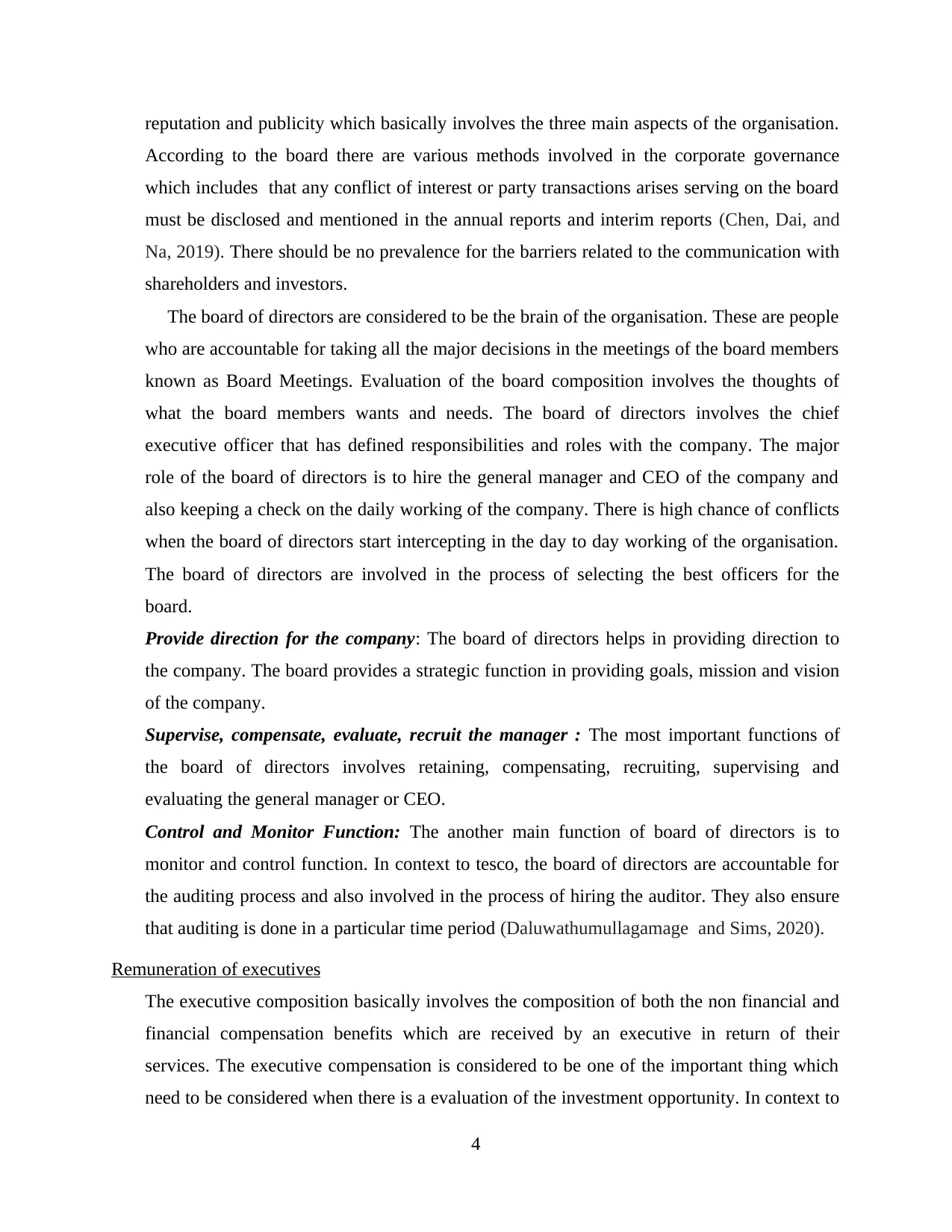
reputation and publicity which basically involves the three main aspects of the organisation.
According to the board there are various methods involved in the corporate governance
which includes that any conflict of interest or party transactions arises serving on the board
must be disclosed and mentioned in the annual reports and interim reports (Chen, Dai, and
Na, 2019). There should be no prevalence for the barriers related to the communication with
shareholders and investors.
The board of directors are considered to be the brain of the organisation. These are people
who are accountable for taking all the major decisions in the meetings of the board members
known as Board Meetings. Evaluation of the board composition involves the thoughts of
what the board members wants and needs. The board of directors involves the chief
executive officer that has defined responsibilities and roles with the company. The major
role of the board of directors is to hire the general manager and CEO of the company and
also keeping a check on the daily working of the company. There is high chance of conflicts
when the board of directors start intercepting in the day to day working of the organisation.
The board of directors are involved in the process of selecting the best officers for the
board.
Provide direction for the company: The board of directors helps in providing direction to
the company. The board provides a strategic function in providing goals, mission and vision
of the company.
Supervise, compensate, evaluate, recruit the manager : The most important functions of
the board of directors involves retaining, compensating, recruiting, supervising and
evaluating the general manager or CEO.
Control and Monitor Function: The another main function of board of directors is to
monitor and control function. In context to tesco, the board of directors are accountable for
the auditing process and also involved in the process of hiring the auditor. They also ensure
that auditing is done in a particular time period (Daluwathumullagamage and Sims, 2020).
Remuneration of executives
The executive composition basically involves the composition of both the non financial and
financial compensation benefits which are received by an executive in return of their
services. The executive compensation is considered to be one of the important thing which
need to be considered when there is a evaluation of the investment opportunity. In context to
4
According to the board there are various methods involved in the corporate governance
which includes that any conflict of interest or party transactions arises serving on the board
must be disclosed and mentioned in the annual reports and interim reports (Chen, Dai, and
Na, 2019). There should be no prevalence for the barriers related to the communication with
shareholders and investors.
The board of directors are considered to be the brain of the organisation. These are people
who are accountable for taking all the major decisions in the meetings of the board members
known as Board Meetings. Evaluation of the board composition involves the thoughts of
what the board members wants and needs. The board of directors involves the chief
executive officer that has defined responsibilities and roles with the company. The major
role of the board of directors is to hire the general manager and CEO of the company and
also keeping a check on the daily working of the company. There is high chance of conflicts
when the board of directors start intercepting in the day to day working of the organisation.
The board of directors are involved in the process of selecting the best officers for the
board.
Provide direction for the company: The board of directors helps in providing direction to
the company. The board provides a strategic function in providing goals, mission and vision
of the company.
Supervise, compensate, evaluate, recruit the manager : The most important functions of
the board of directors involves retaining, compensating, recruiting, supervising and
evaluating the general manager or CEO.
Control and Monitor Function: The another main function of board of directors is to
monitor and control function. In context to tesco, the board of directors are accountable for
the auditing process and also involved in the process of hiring the auditor. They also ensure
that auditing is done in a particular time period (Daluwathumullagamage and Sims, 2020).
Remuneration of executives
The executive composition basically involves the composition of both the non financial and
financial compensation benefits which are received by an executive in return of their
services. The executive compensation is considered to be one of the important thing which
need to be considered when there is a evaluation of the investment opportunity. In context to
4
⊘ This is a preview!⊘
Do you want full access?
Subscribe today to unlock all pages.

Trusted by 1+ million students worldwide
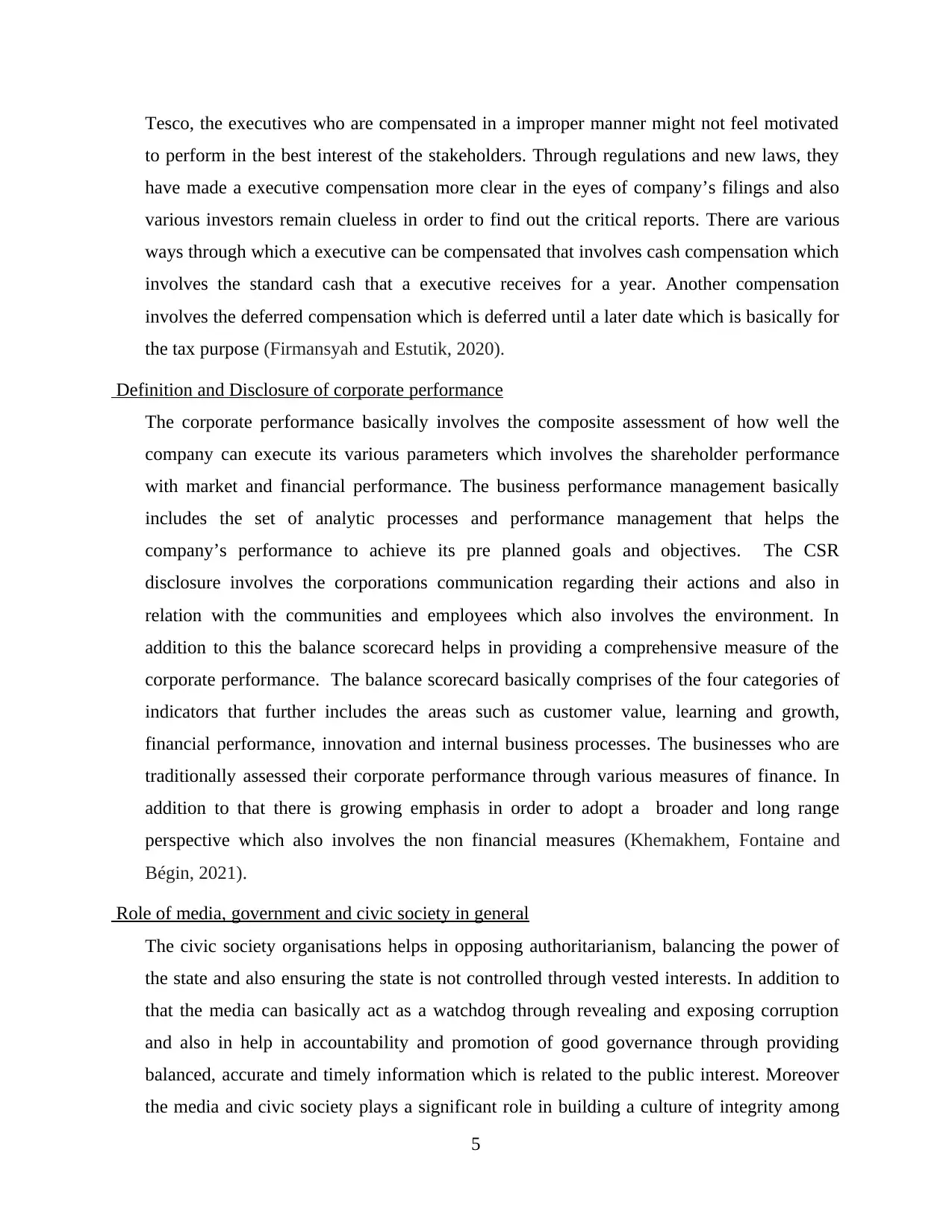
Tesco, the executives who are compensated in a improper manner might not feel motivated
to perform in the best interest of the stakeholders. Through regulations and new laws, they
have made a executive compensation more clear in the eyes of company’s filings and also
various investors remain clueless in order to find out the critical reports. There are various
ways through which a executive can be compensated that involves cash compensation which
involves the standard cash that a executive receives for a year. Another compensation
involves the deferred compensation which is deferred until a later date which is basically for
the tax purpose (Firmansyah and Estutik, 2020).
Definition and Disclosure of corporate performance
The corporate performance basically involves the composite assessment of how well the
company can execute its various parameters which involves the shareholder performance
with market and financial performance. The business performance management basically
includes the set of analytic processes and performance management that helps the
company’s performance to achieve its pre planned goals and objectives. The CSR
disclosure involves the corporations communication regarding their actions and also in
relation with the communities and employees which also involves the environment. In
addition to this the balance scorecard helps in providing a comprehensive measure of the
corporate performance. The balance scorecard basically comprises of the four categories of
indicators that further includes the areas such as customer value, learning and growth,
financial performance, innovation and internal business processes. The businesses who are
traditionally assessed their corporate performance through various measures of finance. In
addition to that there is growing emphasis in order to adopt a broader and long range
perspective which also involves the non financial measures (Khemakhem, Fontaine and
Bégin, 2021).
Role of media, government and civic society in general
The civic society organisations helps in opposing authoritarianism, balancing the power of
the state and also ensuring the state is not controlled through vested interests. In addition to
that the media can basically act as a watchdog through revealing and exposing corruption
and also in help in accountability and promotion of good governance through providing
balanced, accurate and timely information which is related to the public interest. Moreover
the media and civic society plays a significant role in building a culture of integrity among
5
to perform in the best interest of the stakeholders. Through regulations and new laws, they
have made a executive compensation more clear in the eyes of company’s filings and also
various investors remain clueless in order to find out the critical reports. There are various
ways through which a executive can be compensated that involves cash compensation which
involves the standard cash that a executive receives for a year. Another compensation
involves the deferred compensation which is deferred until a later date which is basically for
the tax purpose (Firmansyah and Estutik, 2020).
Definition and Disclosure of corporate performance
The corporate performance basically involves the composite assessment of how well the
company can execute its various parameters which involves the shareholder performance
with market and financial performance. The business performance management basically
includes the set of analytic processes and performance management that helps the
company’s performance to achieve its pre planned goals and objectives. The CSR
disclosure involves the corporations communication regarding their actions and also in
relation with the communities and employees which also involves the environment. In
addition to this the balance scorecard helps in providing a comprehensive measure of the
corporate performance. The balance scorecard basically comprises of the four categories of
indicators that further includes the areas such as customer value, learning and growth,
financial performance, innovation and internal business processes. The businesses who are
traditionally assessed their corporate performance through various measures of finance. In
addition to that there is growing emphasis in order to adopt a broader and long range
perspective which also involves the non financial measures (Khemakhem, Fontaine and
Bégin, 2021).
Role of media, government and civic society in general
The civic society organisations helps in opposing authoritarianism, balancing the power of
the state and also ensuring the state is not controlled through vested interests. In addition to
that the media can basically act as a watchdog through revealing and exposing corruption
and also in help in accountability and promotion of good governance through providing
balanced, accurate and timely information which is related to the public interest. Moreover
the media and civic society plays a significant role in building a culture of integrity among
5
Paraphrase This Document
Need a fresh take? Get an instant paraphrase of this document with our AI Paraphraser
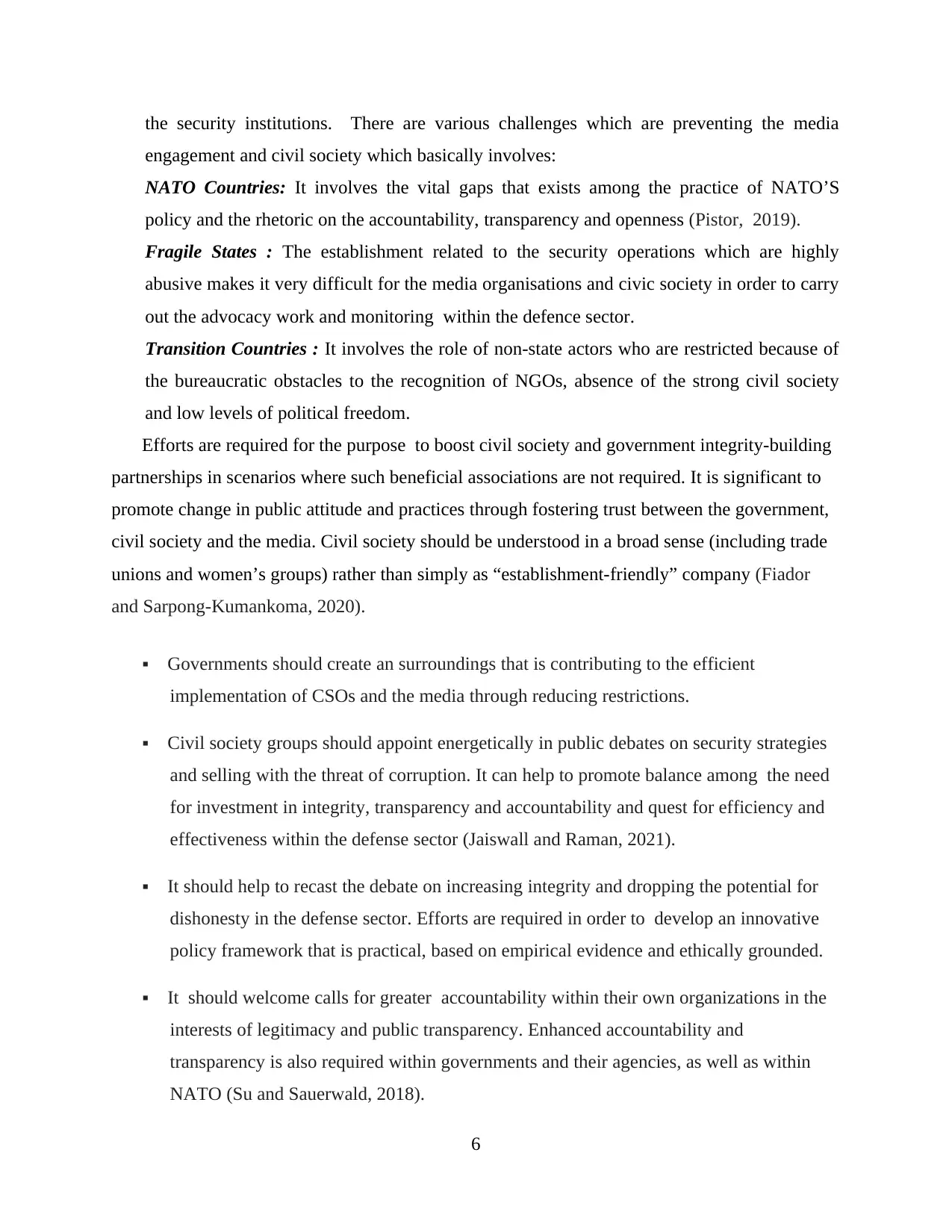
the security institutions. There are various challenges which are preventing the media
engagement and civil society which basically involves:
NATO Countries: It involves the vital gaps that exists among the practice of NATO’S
policy and the rhetoric on the accountability, transparency and openness (Pistor, 2019).
Fragile States : The establishment related to the security operations which are highly
abusive makes it very difficult for the media organisations and civic society in order to carry
out the advocacy work and monitoring within the defence sector.
Transition Countries : It involves the role of non-state actors who are restricted because of
the bureaucratic obstacles to the recognition of NGOs, absence of the strong civil society
and low levels of political freedom.
Efforts are required for the purpose to boost civil society and government integrity-building
partnerships in scenarios where such beneficial associations are not required. It is significant to
promote change in public attitude and practices through fostering trust between the government,
civil society and the media. Civil society should be understood in a broad sense (including trade
unions and women’s groups) rather than simply as “establishment-friendly” company (Fiador
and Sarpong-Kumankoma, 2020).
Governments should create an surroundings that is contributing to the efficient
implementation of CSOs and the media through reducing restrictions.
Civil society groups should appoint energetically in public debates on security strategies
and selling with the threat of corruption. It can help to promote balance among the need
for investment in integrity, transparency and accountability and quest for efficiency and
effectiveness within the defense sector (Jaiswall and Raman, 2021).
It should help to recast the debate on increasing integrity and dropping the potential for
dishonesty in the defense sector. Efforts are required in order to develop an innovative
policy framework that is practical, based on empirical evidence and ethically grounded.
It should welcome calls for greater accountability within their own organizations in the
interests of legitimacy and public transparency. Enhanced accountability and
transparency is also required within governments and their agencies, as well as within
NATO (Su and Sauerwald, 2018).
6
engagement and civil society which basically involves:
NATO Countries: It involves the vital gaps that exists among the practice of NATO’S
policy and the rhetoric on the accountability, transparency and openness (Pistor, 2019).
Fragile States : The establishment related to the security operations which are highly
abusive makes it very difficult for the media organisations and civic society in order to carry
out the advocacy work and monitoring within the defence sector.
Transition Countries : It involves the role of non-state actors who are restricted because of
the bureaucratic obstacles to the recognition of NGOs, absence of the strong civil society
and low levels of political freedom.
Efforts are required for the purpose to boost civil society and government integrity-building
partnerships in scenarios where such beneficial associations are not required. It is significant to
promote change in public attitude and practices through fostering trust between the government,
civil society and the media. Civil society should be understood in a broad sense (including trade
unions and women’s groups) rather than simply as “establishment-friendly” company (Fiador
and Sarpong-Kumankoma, 2020).
Governments should create an surroundings that is contributing to the efficient
implementation of CSOs and the media through reducing restrictions.
Civil society groups should appoint energetically in public debates on security strategies
and selling with the threat of corruption. It can help to promote balance among the need
for investment in integrity, transparency and accountability and quest for efficiency and
effectiveness within the defense sector (Jaiswall and Raman, 2021).
It should help to recast the debate on increasing integrity and dropping the potential for
dishonesty in the defense sector. Efforts are required in order to develop an innovative
policy framework that is practical, based on empirical evidence and ethically grounded.
It should welcome calls for greater accountability within their own organizations in the
interests of legitimacy and public transparency. Enhanced accountability and
transparency is also required within governments and their agencies, as well as within
NATO (Su and Sauerwald, 2018).
6
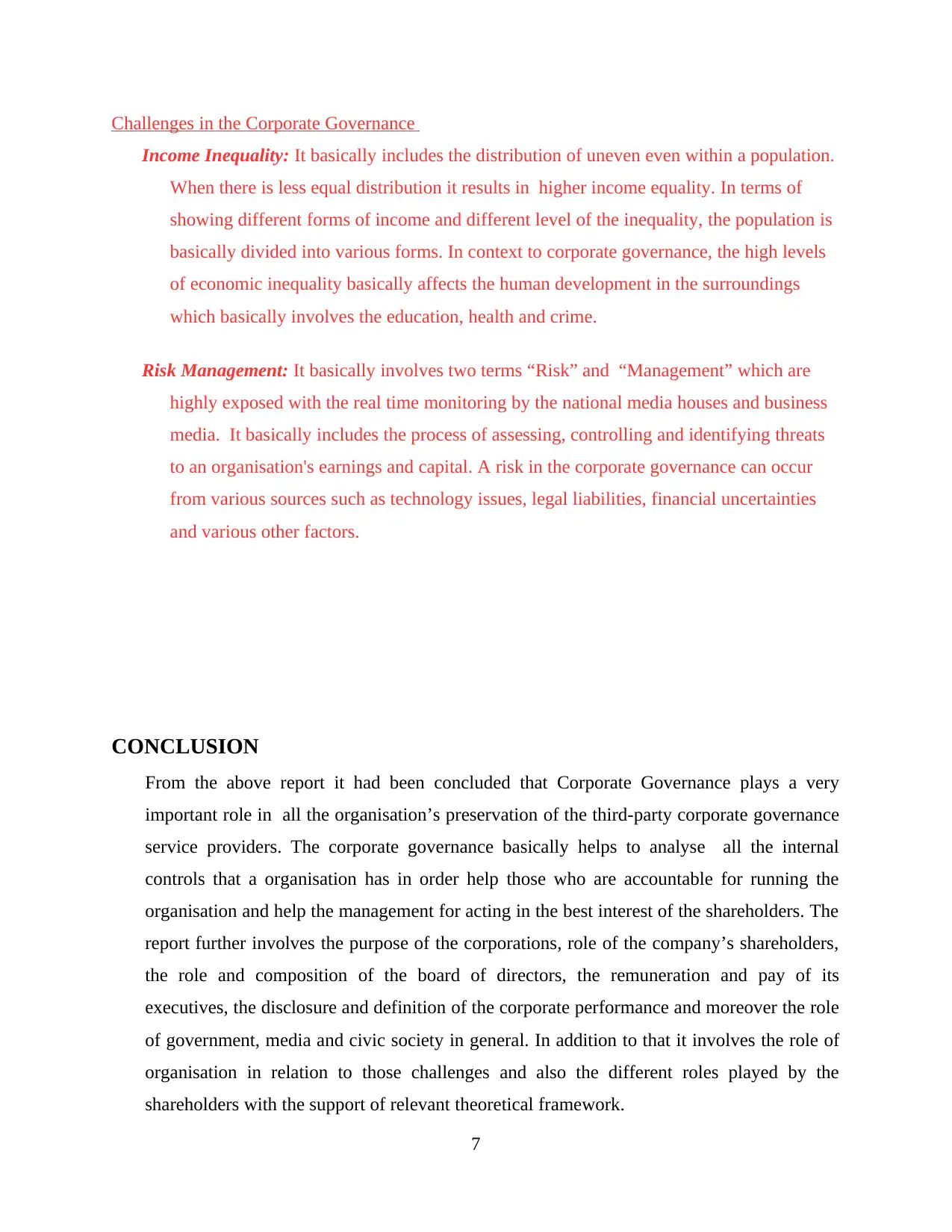
Challenges in the Corporate Governance
Income Inequality: It basically includes the distribution of uneven even within a population.
When there is less equal distribution it results in higher income equality. In terms of
showing different forms of income and different level of the inequality, the population is
basically divided into various forms. In context to corporate governance, the high levels
of economic inequality basically affects the human development in the surroundings
which basically involves the education, health and crime.
Risk Management: It basically involves two terms “Risk” and “Management” which are
highly exposed with the real time monitoring by the national media houses and business
media. It basically includes the process of assessing, controlling and identifying threats
to an organisation's earnings and capital. A risk in the corporate governance can occur
from various sources such as technology issues, legal liabilities, financial uncertainties
and various other factors.
CONCLUSION
From the above report it had been concluded that Corporate Governance plays a very
important role in all the organisation’s preservation of the third-party corporate governance
service providers. The corporate governance basically helps to analyse all the internal
controls that a organisation has in order help those who are accountable for running the
organisation and help the management for acting in the best interest of the shareholders. The
report further involves the purpose of the corporations, role of the company’s shareholders,
the role and composition of the board of directors, the remuneration and pay of its
executives, the disclosure and definition of the corporate performance and moreover the role
of government, media and civic society in general. In addition to that it involves the role of
organisation in relation to those challenges and also the different roles played by the
shareholders with the support of relevant theoretical framework.
7
Income Inequality: It basically includes the distribution of uneven even within a population.
When there is less equal distribution it results in higher income equality. In terms of
showing different forms of income and different level of the inequality, the population is
basically divided into various forms. In context to corporate governance, the high levels
of economic inequality basically affects the human development in the surroundings
which basically involves the education, health and crime.
Risk Management: It basically involves two terms “Risk” and “Management” which are
highly exposed with the real time monitoring by the national media houses and business
media. It basically includes the process of assessing, controlling and identifying threats
to an organisation's earnings and capital. A risk in the corporate governance can occur
from various sources such as technology issues, legal liabilities, financial uncertainties
and various other factors.
CONCLUSION
From the above report it had been concluded that Corporate Governance plays a very
important role in all the organisation’s preservation of the third-party corporate governance
service providers. The corporate governance basically helps to analyse all the internal
controls that a organisation has in order help those who are accountable for running the
organisation and help the management for acting in the best interest of the shareholders. The
report further involves the purpose of the corporations, role of the company’s shareholders,
the role and composition of the board of directors, the remuneration and pay of its
executives, the disclosure and definition of the corporate performance and moreover the role
of government, media and civic society in general. In addition to that it involves the role of
organisation in relation to those challenges and also the different roles played by the
shareholders with the support of relevant theoretical framework.
7
⊘ This is a preview!⊘
Do you want full access?
Subscribe today to unlock all pages.

Trusted by 1+ million students worldwide
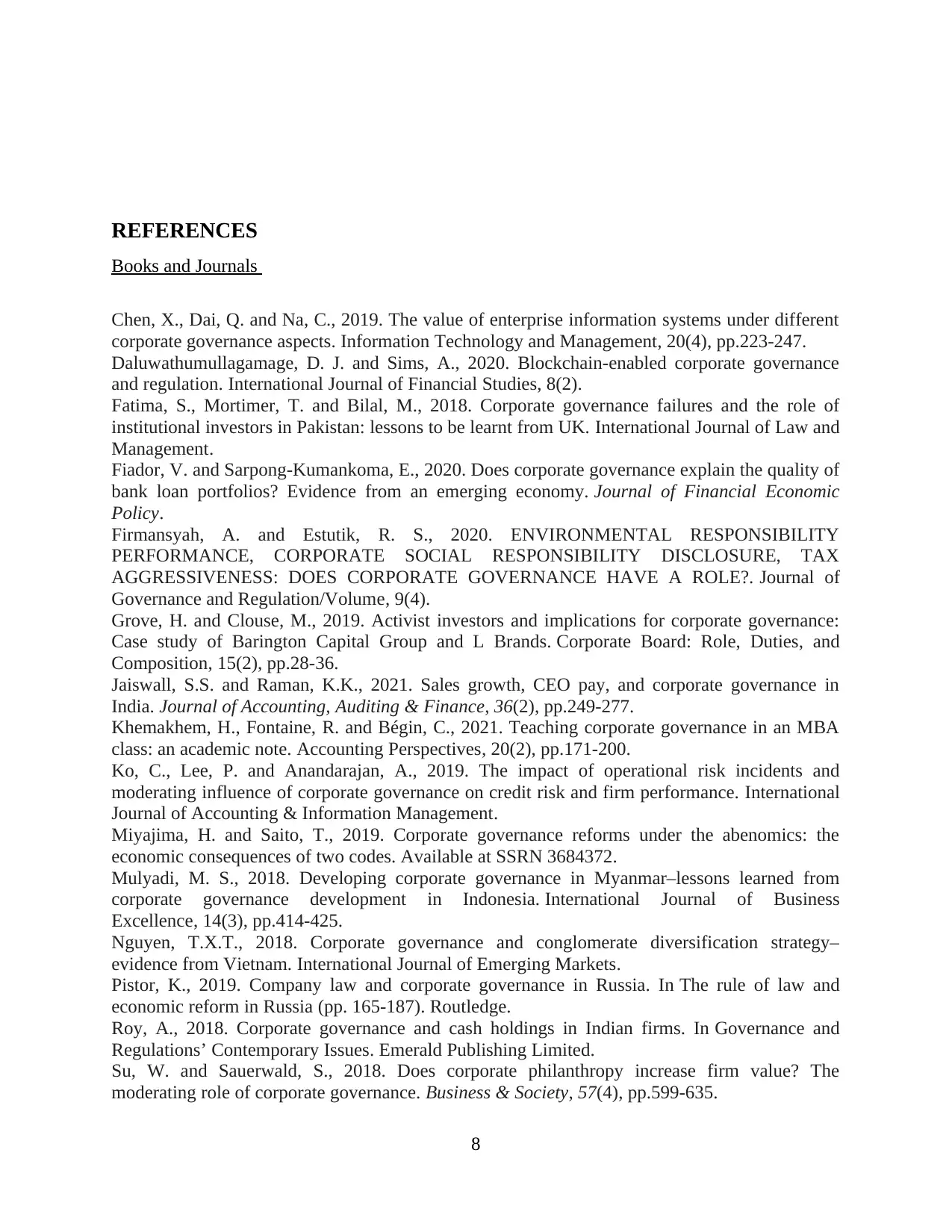
REFERENCES
Books and Journals
Chen, X., Dai, Q. and Na, C., 2019. The value of enterprise information systems under different
corporate governance aspects. Information Technology and Management, 20(4), pp.223-247.
Daluwathumullagamage, D. J. and Sims, A., 2020. Blockchain-enabled corporate governance
and regulation. International Journal of Financial Studies, 8(2).
Fatima, S., Mortimer, T. and Bilal, M., 2018. Corporate governance failures and the role of
institutional investors in Pakistan: lessons to be learnt from UK. International Journal of Law and
Management.
Fiador, V. and Sarpong-Kumankoma, E., 2020. Does corporate governance explain the quality of
bank loan portfolios? Evidence from an emerging economy. Journal of Financial Economic
Policy.
Firmansyah, A. and Estutik, R. S., 2020. ENVIRONMENTAL RESPONSIBILITY
PERFORMANCE, CORPORATE SOCIAL RESPONSIBILITY DISCLOSURE, TAX
AGGRESSIVENESS: DOES CORPORATE GOVERNANCE HAVE A ROLE?. Journal of
Governance and Regulation/Volume, 9(4).
Grove, H. and Clouse, M., 2019. Activist investors and implications for corporate governance:
Case study of Barington Capital Group and L Brands. Corporate Board: Role, Duties, and
Composition, 15(2), pp.28-36.
Jaiswall, S.S. and Raman, K.K., 2021. Sales growth, CEO pay, and corporate governance in
India. Journal of Accounting, Auditing & Finance, 36(2), pp.249-277.
Khemakhem, H., Fontaine, R. and Bégin, C., 2021. Teaching corporate governance in an MBA
class: an academic note. Accounting Perspectives, 20(2), pp.171-200.
Ko, C., Lee, P. and Anandarajan, A., 2019. The impact of operational risk incidents and
moderating influence of corporate governance on credit risk and firm performance. International
Journal of Accounting & Information Management.
Miyajima, H. and Saito, T., 2019. Corporate governance reforms under the abenomics: the
economic consequences of two codes. Available at SSRN 3684372.
Mulyadi, M. S., 2018. Developing corporate governance in Myanmar–lessons learned from
corporate governance development in Indonesia. International Journal of Business
Excellence, 14(3), pp.414-425.
Nguyen, T.X.T., 2018. Corporate governance and conglomerate diversification strategy–
evidence from Vietnam. International Journal of Emerging Markets.
Pistor, K., 2019. Company law and corporate governance in Russia. In The rule of law and
economic reform in Russia (pp. 165-187). Routledge.
Roy, A., 2018. Corporate governance and cash holdings in Indian firms. In Governance and
Regulations’ Contemporary Issues. Emerald Publishing Limited.
Su, W. and Sauerwald, S., 2018. Does corporate philanthropy increase firm value? The
moderating role of corporate governance. Business & Society, 57(4), pp.599-635.
8
Books and Journals
Chen, X., Dai, Q. and Na, C., 2019. The value of enterprise information systems under different
corporate governance aspects. Information Technology and Management, 20(4), pp.223-247.
Daluwathumullagamage, D. J. and Sims, A., 2020. Blockchain-enabled corporate governance
and regulation. International Journal of Financial Studies, 8(2).
Fatima, S., Mortimer, T. and Bilal, M., 2018. Corporate governance failures and the role of
institutional investors in Pakistan: lessons to be learnt from UK. International Journal of Law and
Management.
Fiador, V. and Sarpong-Kumankoma, E., 2020. Does corporate governance explain the quality of
bank loan portfolios? Evidence from an emerging economy. Journal of Financial Economic
Policy.
Firmansyah, A. and Estutik, R. S., 2020. ENVIRONMENTAL RESPONSIBILITY
PERFORMANCE, CORPORATE SOCIAL RESPONSIBILITY DISCLOSURE, TAX
AGGRESSIVENESS: DOES CORPORATE GOVERNANCE HAVE A ROLE?. Journal of
Governance and Regulation/Volume, 9(4).
Grove, H. and Clouse, M., 2019. Activist investors and implications for corporate governance:
Case study of Barington Capital Group and L Brands. Corporate Board: Role, Duties, and
Composition, 15(2), pp.28-36.
Jaiswall, S.S. and Raman, K.K., 2021. Sales growth, CEO pay, and corporate governance in
India. Journal of Accounting, Auditing & Finance, 36(2), pp.249-277.
Khemakhem, H., Fontaine, R. and Bégin, C., 2021. Teaching corporate governance in an MBA
class: an academic note. Accounting Perspectives, 20(2), pp.171-200.
Ko, C., Lee, P. and Anandarajan, A., 2019. The impact of operational risk incidents and
moderating influence of corporate governance on credit risk and firm performance. International
Journal of Accounting & Information Management.
Miyajima, H. and Saito, T., 2019. Corporate governance reforms under the abenomics: the
economic consequences of two codes. Available at SSRN 3684372.
Mulyadi, M. S., 2018. Developing corporate governance in Myanmar–lessons learned from
corporate governance development in Indonesia. International Journal of Business
Excellence, 14(3), pp.414-425.
Nguyen, T.X.T., 2018. Corporate governance and conglomerate diversification strategy–
evidence from Vietnam. International Journal of Emerging Markets.
Pistor, K., 2019. Company law and corporate governance in Russia. In The rule of law and
economic reform in Russia (pp. 165-187). Routledge.
Roy, A., 2018. Corporate governance and cash holdings in Indian firms. In Governance and
Regulations’ Contemporary Issues. Emerald Publishing Limited.
Su, W. and Sauerwald, S., 2018. Does corporate philanthropy increase firm value? The
moderating role of corporate governance. Business & Society, 57(4), pp.599-635.
8
Paraphrase This Document
Need a fresh take? Get an instant paraphrase of this document with our AI Paraphraser

9
1 out of 11
Related Documents
Your All-in-One AI-Powered Toolkit for Academic Success.
+13062052269
info@desklib.com
Available 24*7 on WhatsApp / Email
![[object Object]](/_next/static/media/star-bottom.7253800d.svg)
Unlock your academic potential
Copyright © 2020–2026 A2Z Services. All Rights Reserved. Developed and managed by ZUCOL.





